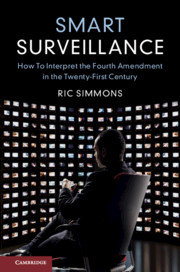Book contents
- Smart Surveillance
- Smart Surveillance
- Copyright page
- Contents
- Acknowledgments
- Introduction
- 1 The Cost–Benefit Analysis Theory
- 2 Measuring the Benefits of Surveillance
- 3 Quantifying Criminal Procedure
- 4 Reactive Surveillance
- 5 Binary Searches and the Potential for 100 Percent Enforcement
- 6 Public Surveillance, Big Data, and Mosaic Searches
- 7 The Third-Party Doctrine Dilemma and the Outsourcing of Our Fourth Amendment Rights
- 8 Hyper-Intrusive Searches
- Conclusion
- Notes
- Index
5 - Binary Searches and the Potential for 100 Percent Enforcement
Published online by Cambridge University Press: 02 August 2019
- Smart Surveillance
- Smart Surveillance
- Copyright page
- Contents
- Acknowledgments
- Introduction
- 1 The Cost–Benefit Analysis Theory
- 2 Measuring the Benefits of Surveillance
- 3 Quantifying Criminal Procedure
- 4 Reactive Surveillance
- 5 Binary Searches and the Potential for 100 Percent Enforcement
- 6 Public Surveillance, Big Data, and Mosaic Searches
- 7 The Third-Party Doctrine Dilemma and the Outsourcing of Our Fourth Amendment Rights
- 8 Hyper-Intrusive Searches
- Conclusion
- Notes
- Index
Summary
Chapter 5 describes a uniquely productive type of surveillance known as a binary search. Binary searches reveal no information other than the absence or presence of illegal activity. The Supreme Court has correctly determined that a binary search does not implicate the Fourth Amendment, since an individual does not have a legitimate expectation of privacy in illegal conduct. The cost–benefit analysis theory encourages binary searches, because they are the perfect example of positive sum surveillance: if designed properly, they can increase the level of crime detection without increasing the level of privacy infringement. Soon facial recognition technology and advances in crime recognition software will allow law enforcement to achieve nearly 100 percent enforcement for certain crimes. Such a development, though theoretically desirable, has potentially negative side effects.
- Type
- Chapter
- Information
- Smart SurveillanceHow to Interpret the Fourth Amendment in the Twenty-First Century, pp. 102 - 118Publisher: Cambridge University PressPrint publication year: 2019



